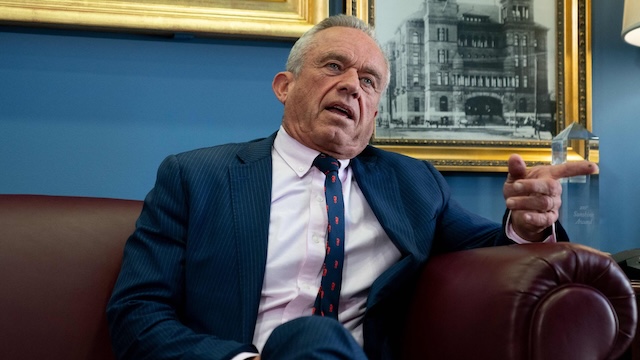RFK Jr. at HHS: Champion of Chronic Disease or Controversial Disruptor?
3 minute readPublished by BNN

As RFK Jr. steps into the role of Secretary of Health and Human Services, his mission to tackle America's chronic disease epidemic and upend entrenched systems will define his legacy. His crusade framed by "Make America Healthy Again" (MAHA) targets ultra-processed food, wasteful spending on infectious disease, and pharmaceutical influence. But controversial vaccine policies, sweeping staffing cuts, and politicized claims have raised alarm. Can he truly deliver better health outcomes or will disruption derail progress?
1. Chronic Disease vs. Infectious Disease Spending
The Critique
RFK Jr. argues that federal health budgets overly favor infectious disease while neglecting chronic conditions like obesity, diabetes, and cancer. He characterized this imbalance as a reflection of priorities shaped by Big Pharma and the processed food industry profiting from long-term treatments rather than cures. His claim: nearly all federal health dollars go to infectious disease, leaving chronic disease underfunded.
What the Data Shows
Government records paint a different picture. In 2023 alone, the National Institutes of Health directed $8.2 billion toward infectious disease research - ranking ninth among research categories - but chronic diseases received similar or greater funding: $7.9 billion for cancer, plus billions directed at Alzheimer’s, heart disease, diabetes, and more. Meanwhile, chronic conditions account for an estimated 90% of U.S. health spending. (Referenced under section for "United States")
Yet, RFK Jr. isn't entirely wrong in emphasizing chronic illness. While infectious disease gets acute funding attention, chronic disease demands long-term investment in "etiology" - understanding root causes. He emphasizes environmental toxins and diet, which he says are underaddressed.
2. MAHA Food Agenda: Ambitious, Scientific, or Symbolic?
What He Proposes
The MAHA initiative targets additives, ultra-processed foods ("UPFs"), and artificial dyes, labelling them "poison" in Senate testimony. He aims to ban additives already restricted in other nations and overhaul school nutrition, FDA standards, and the Dietary Guidelines. His MAHA Commission flagged processed foods, chemicals, stress, and vaccines as central to childhood chronic disease.
International Comparisons
Europeans already regulate many of these additives. The EU restricts tartrazine and other dyes, adopts front-of-pack warning labels like Chile, and limits ultraprocessed-ingredient lists. Yet critics caution that labeling alone yields marginal gains and that structural food environments drive consumption more powerfully than bans alone nypost.com .
Time and The Hill note that labeling and education, if tied to enforceable FDA mandates, like sodium limits or dye-free criteria, could narrow health disparities.
3. Vaccine Policy: Science or Skepticism?
Vaccine Reforms
RFK Jr. has disbanded the CDC’s Advisory Committee on Immunization Practices (ACIP), appointing individuals skeptical of vaccines and halted COVID vaccination for healthy individuals and pregnant women. He also paused contributions to Gavi, the global vaccine alliance, citing concerns about suppressed safety debate.
Are His Concerns Valid?
On one hand, scrutinizing vaccine safety and removing conflicts of interest is a legitimate public health function. Vaccines remain among the most debated health interventions. RFK Jr. is pressing for stronger science, greater transparency, and more rigorous review.
Risks and Backlash
Public health experts warn his overhaul strikes at the foundations of vaccine confidence. Critics argue the move exceeds scientific rigor and leans toward misinformation. The abrupt shift ignited fierce criticism: Democrats assert it will cost lives; even some Republicans are cautious.
4. Administrative Turbulence: Can He Walk the Talk?
Budget, Staff, and Mixed Signals
Under RFK Jr., HHS has cut approximately 25% of its workforce by firing or buyouts, coinciding with cuts to SNAP-Ed, lead-poisoning programs, and environmental protections. That raises a paradox: dismantling public health infrastructure while touting reforms in the same domain.
NPR notes chronic disease efforts deepened while traditional public health programming was eliminated, weakening credentials for actually turning the rhetoric into results . Staff describe bureaucratic chaos and eroded morale.
5. The Bigger Picture: Flawed Path or Fresh Perspective?
-
Chronic Disease Insights
RFK Jr. spotlights legitimate issues: excessive chronic illness, food-driven literacy, and environmental health factors. These deserve more scientific and regulatory attention.
-
Systemic Changes
His proposed bans and labeling efforts echo successful international models, such as Chile, Israel, and EU standards.
-
Infectious/Chronic Balance
However, framing infectious disease research as wasteful ignores its indispensable role in preventing chronic complications like Long COVID and HPV-linked cancers.
-
Trust in Vaccines
Auditing safety processes is valid, but dismantling advisory bodies risks sowing confusion, undermining consensus, and jeopardizing public trust.
-
Administrative Follow‑Through
Bold ideals need backing by coherent policy and infrastructure. Yet staffers and program cuts are undermining effectiveness on the ground.
Conclusion: A Work in Progress
RFK Jr.'s agenda reframes health around chronic disease, environmental factors, and food quality-areas that deserve more focus in the nation's health narrative. His echo of international examples suggests bold ambition, and his critique of vertical systems speaks to longstanding gaps.
Yet his approach leans toward erasure over reform: firing staff, dissolving advisory panels, and overstating data in ways that risk undermining the very expertise the country needs. Vaccine policy and infectious disease must be defended even while we elevate chronic care, and doing both requires nuance and steadiness.
Ultimately, RFK Jr. remains a polarizing figure, a crusader for change, but one whose execution trails his rhetoric. American health may benefit from his focus on chronic disease and food reform, but only if institutional chaos is reined in and public trust preserved.
What do you think? Does RFK Jr. herald a long-overdue health revolution, or are his methods too rough around the edges to deliver on the promise?